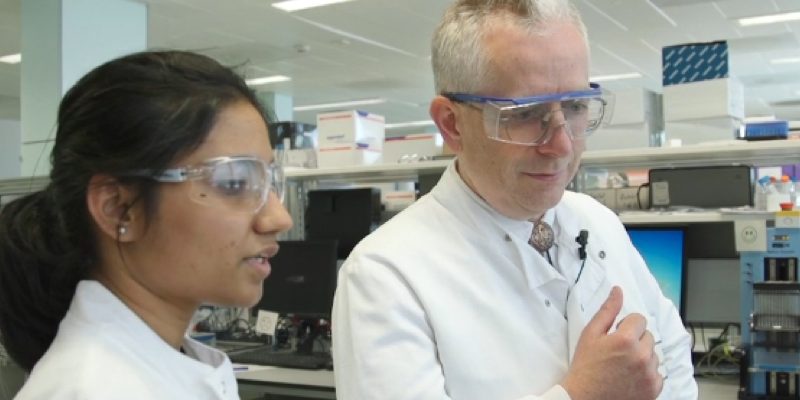Institute leader named winner of 2019 Tilden Prizes
Professor James Naismith has been named winner of the prestigious Tilden Prizes from the Royal Society of Chemistry.
Professor Naismith, of the Rosalind Franklin Institute, the University of Oxford, and the research Complex at Harwell, has won the award for career-long breakthroughs in structural and chemical dissection of natural product biosynthesis.

Receiving the award, Professor Naismith said:
“This award recognises the team work of the talented students, technicians and post-docs who I have been very fortunate to have worked with. Without UKRI, EU and Wellcome funding and access to synchrotrons, Diamond in particular, none of this would have been possible. I have always loved chemistry, I still find enzymes the most interesting problem in science. Finding out how they work has been the very fulfilling and this award is a lovely bonus.”
Professor Naismith lives in Oxford, but spent 23 years as an academic at St Andrews. He was born and raised in Hamilton, Scotland and is a proud graduate of the local state school Hamilton Grammar. In winning the award, Professor Naismith also receives £5,000 and a medal.
Dr Robert Parker, chief executive of the Royal Society of Chemistry said:
“Over the years, our lives have been significantly improved by the chemical sciences, from medicines and food to the environment itself. We are proud of the contribution the chemical sciences make to our global community, which is why it is right for us to recognise important innovations and expertise such as these.
“Our Prizes and Awards recognise people from a range of different specialisms, backgrounds and locations. Every winner is an inspiration to the chemistry community and will play an incredibly important role in enriching people’s lives for generations to come.”
Nature makes complex and powerful chemicals called natural products. Almost all our medicines come from natural products and chemists have been interested in these molecules for generations. Many of these molecules are very hard, if not impossible, to make in the lab. The lab’s interest is in how nature uses enzymes, protein molecules made in the cell, to stitch together building blocks to make such exciting and promising molecules.
The Royal Society of Chemistry’s Awards and Prizes are awarded in recognition of originality and impact of research, or for each winner’s contribution to the chemical sciences industry or education. They also acknowledge the importance of teamwork across the chemical sciences, as well as the abilities of individuals to develop successful collaborations.
Of those to have won a Royal Society of Chemistry Award, an illustrious list of 50 have gone on to win Nobel Prizes for their pioneering work, including 2016 Nobel laureates Jean-Pierre Sauvage, Fraser Stoddart and Ben Feringa.
The Tilden Prizes, established in 1939, are named for Sir William Augustus Tilden, British chemist and pioneer in the teaching of science.
As part of the award, Jim will undertake a lecture tour across the UK. Details of the lectures will be made available on the Institute website.
For more on the Royal Society of Chemistry and the awards see www.rsc.org.